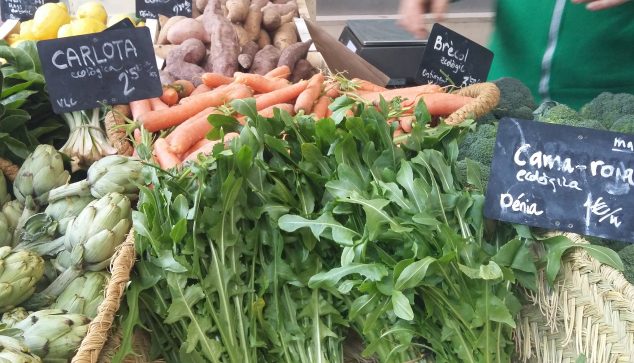The document “From the farm to the taula”, published by the European Commission in the coming weeks, which we will begin to discuss last week, proposes a strategy aimed at territorial agri-food systems to escape the crisis exacerbated by COVID-19. XNUMX. It is a proposal that follows, deepens and reinforces, if not more, the path marked out by the Dénia project&Marina Alta Tastinglife of the UNESCO Creative City.
L’estratègia es lliga amb el Pacte Verd Europeu, que estableix la manera de convertir Europa en el primer continent climàticament neutre d’ací a 2050. Defineix una nova línia de creixement sostenible i integrador per a impulsar l’economia, millorar la salut i la qualitat de vida de les persones, cuidar de la naturalesa i no deixar a ningú arrere.
“De la granja a la taula” representa finalment el postulat de la UE, en forma de propostes normatives i polítiques, el que hauria de ser un punt de canvi a una forma d’entendre l’economia i la qualitat de vida dels ciutadans europeus d’ara endavant. El mateix informe ho defineix com “transició justa”, especialment després de la pandèmia de la COVID-19 i l’afebliment de l’economia. Ha hagut de ser, dissortadament, la COVID qui accelerarà aquest procés.
This "transition" to sustainable food systems is also defined in the document as an economic opportunity. The citizens are evolving and promoting significant significance in the food market, obrint expectations for farmers, fishermen, aquaculturists, transforming companies and the distribution chain and the set of food services. Among the most outstanding fets is the power of assenyalar:
- Que la producció, el transport, la distribució, la comercialització i el consum d’aliments, tinga un impacte mediambiental neutre o positiu.
- Garantir la seguretat alimentària, la nutrició i la salut pública, l’accés a aliments que complisquen nivells elevats d’innocuïtat, qualitat, fitosanitaris i de salut i benestar animal.
- Preservar l’assequibilitat dels aliments, al mateix temps que es genera un rendiment econòmic més just en la cadena de subministrament, de manera que els aliments més sostenibles siguen també, en última instància, els més assequibles.
- Recolzar les solucions tecnològiques, digitals i basades en la naturalesa i en l’espai, per a obtindre millors resultats climàtics i mediambientals i augmentar la resiliència enfront del canvi climàtic.
- Reduir i optimitzar l’ús d’inputs (per exemple, plaguicides i fertilitzants).
- Guarantee an easier accés to the mercat per a traditional varietats and locally adapted.
- Fomentar l’agricultura ecològica. Es presentarà un pla d’acció sobre agricultura ecològica. Això ajudarà els Estats membres a estimular tant l’oferta com la demanda de productes ecològics. Que, almenys, el 25% de les terres agrícoles de la UE s’utilitzen en agricultura ecològica d’ací a 2030.
- Els nous “règims ecològics” oferiran una important font de finançament per a impulsar les pràctiques sostenibles, com l’agricultura de precisió, l’agricultura ecològica, la captura de carboni en sòls agrícoles i l’agrosilvicultura. Els Estats membres i la Comissió hauran de garantir que els plans estratègics proporcionen els recursos adequats i apliquen aquests règims. La Comissió donarà suport a la introducció d’un pressupost mínim compartimentat per als règims ecològics.
- Estimular pràctiques sostenibles de transformació d’aliments, comerç majorista i minorista, hostaleria i serveis alimentaris.
- The food industry and the retail sector have to show the cam augmentant the availability i
assequibilitat d’opcions alimentàries saludables i sostenibles a fi de reduir la petjada mediambiental general del sistema alimentari. - Promoure el consum sostenible d’aliments i facilitar la transició a dietes saludables i sostenibles.
- Estudiar mètodes per a harmonitzar les declaracions ecològiques voluntàries i crear un marc d’etiquetatge sostenible que abaste, en sinergia amb altres iniciatives pertinents, els aspectes nutricional, climàtic, mediambiental i social dels productes alimentaris. Això ajudarà al fet que ciutats, regions i autoritats públiques contribuïsquen mitjançant l’aprovisionament d’aliments sostenibles.
- Promoure la salut del sòl i els aliments tindrà per objecte desenvolupar solucions per a restaurar la salut del sòl i les funcions d’aquest.
- Internet de banda ampla ràpida en les zones rurals per a aconseguir l’objectiu del 100% d’accés per a 2025.
- Incorporar serveis d’assessorament, intercanvi de dades i coneixements, i capacitats. Els coneixements i l’assessorament són fonamentals perquè tots els agents del sistema alimentari puguen arribar a ser sostenibles.
- Mitjançant serveis d’assessorament a mesura, proporcionarà informació i orientació als agricultors i vincularà l’experiència d’aquests amb els projectes d’investigació i de l’Associació Europea per a la Innovació. Això millorarà la sostenibilitat dels agricultors participants, així com els seus ingressos.
- Encourage investment in EU nous projectes mitjançant garanties pressupostàries in the InvestEU Fund or EU taxonomy.
This strategy means an important country for the determined orientation of economic models that support the well-being of people (economy, health, quality of life) with that of ecosystems, and is traditional in legislative proposals, drafting of models, codis and altres eines administratives per planning, evaluating and financing actions. This is a fet clau to be able to donate form to that model that turned the Pacte Verd Europeu into an opportunity to reconcile our food system with the needs of the planet and to respond positively to the aspirations of the Europeans in relation to healthy eating. , equitable and respectful with the environment.
The European Commission has shown the following letters to mark the camí, per prendre the world leader in matters of sustainable food systems, incorporating all sectors and territories, aware that they may be avant-garde for all ells.
Why not think about the agri-food sector as a nova industry transformer of the social canvi, in a rational way and with a commitment to the territory? A nova semblant economy that will represent the irruption of tourism there pels anys seixanta del segle passat. The agro-gastronomic sector will go from being a complement to the tourist offer to diversifying the economy of the region. Some of them are fent.
A Dénia and the Marina Alta tenim l'opportunitat d'avançar-nos, portem a camí Recorregut in the gastronomic sector and is where the conditions per fer-ho. If the agri-food systems are located in the center of development and sustainability, the Marina Alta has a historical position to be a pioneer. This must be a choral bar, viewed and executed in conjunction, looking for the common spaces and the private benefits.
Bodies with Unesco and the European Commission have a special interest in generating pilot experiences to determine the ability to replicate projects in high cities or territories, to validate their effectiveness and to be able to create reference models. The Marina Alta, per location, surface and characteristics, is the best territorial unit for being a model.








For living in Spain for 30 years I understand and speak Spanish well. I am French and also European and I speak with the Spanish in Spanish. I live in Denia and I am interested in the press releases about the life of Denia and the region.
Now, I do not understand the Valencian and I think that the same happens to many Europeans.
Thank you very much for communicating in Spanish, so we can all understand it! That's what it's about, isn't it?
Totally agree!!!?